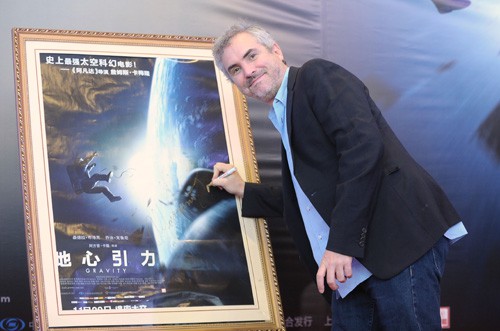|
 |
|
AUTOGRAPH: Alfonso Cuarón signs the poster for the Chinese release of his film Gravity in Beijing on November 18 (CFP) |
In Hollywood, saving the world is an American specialty, with U.S movie heroes often portrayed as clutching the human race from the arms of natural disasters, unexpected terrorist attacks or powerful aliens.
However, in recent years, Hollywood has started sharing the honor of world savior with other countries. For example, China is increasingly catching attention of American movie makers due to its rising economic status.
Soaring at box office
Currently, Hollywood space adventure Gravity is achieving a lot of success in China. Directed by Alfonso Cuarón, and staring Sandra Bullock alongside George Clooney, the sci-fi epic earned $4.7 million in China on November 19, marking the biggest non-holiday opening day of all time for a Warner title. In the following two weeks, the 3D film has earned over 350 million yuan ($57.4 million) and a dominating 68 percent share of the Chinese market, according to EntGroup, a leading entertainment research service provider in the country. Up to the end of November, the Chinese mainland accounts for one sixth of the movie's earnings abroad.
Gravity highlights an unprecedented visual experience of outer space. It depicts grand scenes of the universe and earth from an orbital angle, with close to real-life visual effects associated with space vacuums and zero gravity.
The Chinese space station Tiangong and a Shenzhou spacecraft are also featured in the story. In particular, U.S. astronaut Ryan Stone, played by Bullock, takes refuge in the space station while making her escape to earth aboard the spacecraft. Without China's presence in space, the U.S. astronaut would not have survived her ordeal.
But why did Gravity include a Chinese space station? Director Cuarón told local press in Beijing that, since Gravity first hit U.S. screens in October, cinema-goers have viewed the space station's inclusion as a clever marketing tactic to achieve distribution rights in the world's second largest movie market, with China's box office having scored $2.7 billion in the first nine months of 2013 alone.
However, Cuarón has denied deliberately pandering to the Chinese market, saying his storyline had nothing to do with winning over the country's film regulators and fans.
"When we were mapping out the story, we had to base it upon current elements in space," the director told People's Daily.
According to Cuarón, Gravity centers on the near future, most likely 2016. At that time, the Tiangong space station is likely to already exist.
"We had the Hubble Space Telescope, the International Space Station, Tiangong station and a Shenzhou escape pod. That's what was in space; and this is way before China became sexy for the Hollywood box office," Cuarón added.
Cuarón said he started drafting the outline for Gravity in 2008, when China's annual box office made only $680 million, with its Tiangong-1 space station still to blast off in September 2011.
"I know films that incorporate Chinese elements just for the market," but the original storyline for astronaut Stone to flee from the Hubble Space Telescope to the International Space Station, to the Tiangong, makes sense, Cuarón explained.
Furthermore, Chinese scientists said the Tiangong-1 experimental space vessel would automatically leave orbit and crash into the South Pacific Ocean at the end of its service around 2016, which also complies with the film's plot.
| 